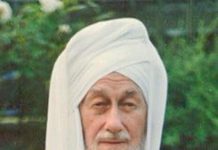By Bashir Nuckchady
The Charter of the Olympic Games emphasizes the Olympic values of excellence, respect, and friendship, which promotes the development of sport, the promotion of peace, and the encouragement of understanding and respect among nations and people; while building and fostering a sense of camaraderie, understanding among people from diverse backgrounds that creates bonds and bridging cultural, national, and social divides and upholding the principles of honesty, integrity, and justice in all aspects of competition. This includes adhering to rules, competing ethically, and ensuring a level playing field for all athletes. The Games aim to reflect and embrace the richness of human diversity, which promote peace and mutual understanding among nations and serve as a reminder of the potential for sports to bring people together and inspire harmony, transcending political and social conflicts.
However, the world witnessed the participation of the state of Israel’s athletes, that is perpetrating a genocide, was present alongside the sporting nations of the world. On the other hand, Russian and Belarusian athletes, were present but did not compete under their flags, colours or anthems, while their counterparts from Israel – a regime considered as engaging in a genocide, walked proudly under their flag and national anthem.
The double standards of the International Olympic Committee (IOC) at play in the Olympic games is vivid. We have the right to ponder why the action against Russia was undertaken with such haste whilst the IOC was reluctant to act upon the anti-Palestinian entity, i.e. Israel, whose national pastime is not just killing Palestinians, that seems to be their national sport.
Various sources reported that more than 80 sports facilities have been destroyed or damaged in Gaza and 90 percent of the sports facilities in the Gaza Strip have been destroyed and vandalised since the beginning of the Israeli genocidal war. Stadiums have been turned from places of joy and community well-being into places of torture, imprisonment, and executions.
Furthermore, the blasphemous portrayal of the Last Supper, the exhibition of the devilish icon of the golden calf, the overt promotion of LGBTQ+, at its opening ceremony and the banning of wearing of Hijaab for Muslim athletes are proof enough that the Olympic ideals, we all once believed in, are dead at the altar of the politics of greed, hatred and big money.
From an Islamic perspective, sport and religion have many things in common. The two share more commonalities than one might think. Although the first pertains to the spheres of life and the other to the sacred, they both bring communities together and share similar values, including dedication, faith, commitment, and sacrifice.
Human beings consist of body and spirit, and it is the duty of each Muslim to protect the body and keep it strong and healthy. Sport provides some of the best ways to strengthen the immune system and protect the body from diseases and other health issues. Therefore, physical activities have been a vital element in Islamic cultures since the beginnings of the religion.
The Olympics originated in ancient Greece, and during the times of the Alexander the Great Empire, the Greek Islands and lands of Asia Minor, which are now the territory of Turkey, began producing a large number of Olympic athletes. As leaders, we must provide the next generation with the tools they need to be good citizens of societies and valued participants in the global conversations that will define our future.
Wrestling and other sport disciplines were well known to Prophet Muhammad, and archery and other sports had an important role in early Islam. Athletic achievements were prestigious, and great athletes were admired and rewarded. In urging his followers to be physically fit, Prophet Muhammad said, ‘The strong believer is better and more beloved to Allah than the weak believer, while there is good in both.’ Prophet Muhammad was an amateur athlete and eagerly practiced himself, engaging in swimming, running and horseback riding. He encouraged others, especially children and their parents, to embrace physical activity.
Today, Muslim athletes can be counted among the greatest Olympic champions. A strong work ethic, persistence, perfectionism, and peaceful competition are only a few features common for successful athlete and exemplary followers of Islam. Those virtues undoubtedly have helped these athletes climb the Olympic podium. However, Islamic athletes do not only win medals; they also help change negative stereotypes about their culture on a global scale.
Time Magazine published a story in 2016, about Muslim Olympic athletes demonstrating a positive image of Islam. Mo Farah, a Somali-British long-distance runner, fell on the track in the middle of the race, he not only got up and rejoined the race but claimed gold medal. Mohamed Sbihi, the gold-medal-winning rower, became the first Muslim athlete to carry the British flag at the opening ceremony, at the Tokyo Olympics 2020.
Several other Muslim athletes have made significant contributions to sports across the globe, demonstrating excellence and breaking barriers in various disciplines, namely: Muhammad Ali, one of the greatest boxers of all time; Khabib Nurmagomedov, a retired Russian mixed martial artist, known for his undefeated record and for his strong adherence to Islamic principles; Amna Al Haddad, an Emirati weightlifter and fitness advocate, who always wears a hijab while competing, has been an influential figure in promoting sports; Tarek Hamdi, won the silver medal for Saudi Arabia during the Men’s Karate Kumite +75kg final at the Tokyo 2020 Olympics. Before that, Hamdy had won first place at four tournaments in the 75 kg category. He shined at the Asian Championship in Indonesia.
Probably no one knows more about breaking stereotypes in sports than Muslim women athletes. Contrary to popular belief, sports are allowed to women also in Islam. Ibtihaj Muhammad was the first Muslim-American woman to wear a hijab while competing for the United States in the Olympics, in 2016. She won a bronze in sabre fencing and 25 world medals. She paved the way for other talented and hard-working Muslim women athletes, like the weightlifter Sara Ahmed, representing Egypt in the Olympics in Rio de Janeiro. She won the bronze medal in the 69kg weight class. Having lifted a combined weight of 255kg, she was the first Arab woman to win an Olympic medal in this discipline. Her achievement was a voice against the misconception about the hijab being an oppressive tool limiting Muslim women. Sania Mirza, an Indian tennis player who has been one of the top-ranked female tennis players in the world. Even Prophet Muhammad’s wife, Aisha, was said to practice running and compete with her husband, and even outplay him. Nevertheless, Muslim women athletes find that they still must face their competitors while at the same time facing down harmful stereotypes.
Those athletes mentioned above, not only excel in their respective sports but also serve as role models, showcasing the intersection of athleticism and cultural identity. With a thriving sports tradition in Islamic culture, Muslims have pursued excellence in many Olympic disciplines. The rules they follow as professional athletes, together with the values of the believers of Islam, help them strive for excellence. While they also win respect for their culture and religion on the global stage.



![[Hajj 2025] First Step in the Kaaba](https://sundaytimesmauritius.com/wp-content/uploads/2025/05/Bachir-Nuckchady-218x150.jpg)



![[Khutbah – La Réflexion du Vendredi] L’exploitation sexuelle, signe d’une société malade](https://sundaytimesmauritius.com/wp-content/uploads/2025/05/couverture-218x150.jpg)

![[Eid-Ul-Adha] Une série de dispositions déjà prises](https://sundaytimesmauritius.com/wp-content/uploads/2025/05/eid-al-adha-bangladesh-150x150.jpg)
![[Un nouveau pape pour l’Église] Léon XIV élu souverain pontife](https://sundaytimesmauritius.com/wp-content/uploads/2025/05/Pape-150x150.webp)
![[SUAC] Préparatifs du Hajj et du Qurbani : Appel à la vigilance et à la transparence](https://sundaytimesmauritius.com/wp-content/uploads/2025/03/images-150x150.jpg)

![[Eid-Ul-Adha] Une série de dispositions déjà prises](https://sundaytimesmauritius.com/wp-content/uploads/2025/05/eid-al-adha-bangladesh-100x70.jpg)
![[Un nouveau pape pour l’Église] Léon XIV élu souverain pontife](https://sundaytimesmauritius.com/wp-content/uploads/2025/05/Pape-100x70.webp)
![[SUAC] Préparatifs du Hajj et du Qurbani : Appel à la vigilance et à la transparence](https://sundaytimesmauritius.com/wp-content/uploads/2025/03/images-100x70.jpg)